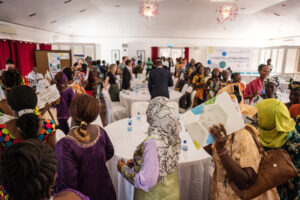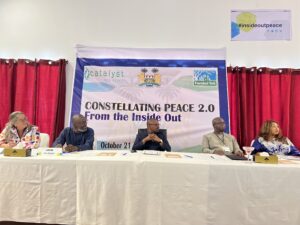By James Momodu Dao Samba
 (Sierra Leone) Our country’s journey to peace has been nothing short of inspiring. From the ashes of civil war, communities have found ways to heal, mend relationships, and build a future rooted in unity.
(Sierra Leone) Our country’s journey to peace has been nothing short of inspiring. From the ashes of civil war, communities have found ways to heal, mend relationships, and build a future rooted in unity.
Now, a gathering called Constellating Peace is celebrating what Sierra Leone has achieved and bringing community leaders, peace activists, and government officials from around the world to learn from the nation’s work. Opening this week, Constellating Peace celebrates Sierra Leone’s commitment to fostering peace through cultural and grassroots methods, setting the stage for powerful conversations on how far we have come and what lies ahead in the journey toward lasting peace.
“We have come a long way as a nation,” reflects Bockarie Sam, section Chief of Borkor Section, Peje Bongre Chiefdom, Kailahun District, a peace leader from the country’s Eastern region. “Our communities have taken the lead in defining what peace means to them, rooted in our cultural values.”
International conference participants—from Somalia, Kenya, Nepal. Colombia, the United States, Ireland, and beyond—will attend sessions that highlight the ongoing impact of Fambul Tok, which has been at the forefront of Sierra Leone’s reconciliation process. Through workshops, panels, and community visits, attendees will explore the core themes of the conference, including traditional peace practices, local governance, and the integration of peace messaging into Sierra Leone’s national infrastructure.

The opening ceremony featured remarks by the Hon. Vice President of Sierra Leone, Dr. Mohamed Juldeh Jalloh, and other eminent officials
The Constellating Peace conference will feature a wide range of voices from across Sierra Leone and the global peacebuilding community. These voices include Fambul Tok’s Peace Mothers, international peace advocates, and government officials, all of whom share a deep commitment to sustaining peace in their communities. Their personal stories and reflections will provide a window into the heart of Sierra Leone’s peace journey.
Mariatu Barrie, Peace Mother and chiefdom animator, Bagruwa Chiefdom in Moyamba District, offers a poignant reminder of the importance of traditional peace practices. “Our strength comes from our ancestors. They remind us that peace is not just the absence of conflict but the presence of unity.” Barrie, like many other women involved in grassroots peace-building, has been instrumental in mediating disputes and facilitating reconciliation in her community. Her work, alongside many others, exemplifies the importance of women’s involvement in the peace process.
John Caulker, the executive director of Fambul Tok International, echoes this sentiment, emphasising the emotional and cultural significance of the conference. “This is not just a conference; it is a gathering of hearts dedicated to peace. We come together to share, reflect, and strategise on how to sustain peace in our beloved Sierra Leone,” he says. For Fambul Tok, this gathering is a continuation of the organisation’s mission to bridge communities, fostering long-term peace through local engagement and dialogue.
The conference will also bring international perspectives into the conversation. At the event, “We are grateful to the government of Sierra Leone for hosting this important dialogue on peacebuilding and sustainable development. Led by Libby Hoffman of Catalyst for Peace and Fambul Tok, under John Caulker’s guidance, the gathering fosters global collaboration for a peaceful future. Fambul Tok’s work, rooted in Sierra Leone’s own peace journey, has built resilience in communities worldwide. Now, the world can learn from Africa’s experiences, as Sierra Leone’s history of conflict and reconciliation offer valuable lessons for creating durable peace,” says Dr. Tecla Namachanja Wanjala, of the Shalom Centre for Counselling and Development in Kenya.
At the heart of the Constellating Peace conference is a celebration of different methods of community conversation. One of the most powerful examples of this is the tradition of community storytelling, where elders and leaders recount the history of their communities and the conflicts they have overcome. These stories are not just recollections of the past; they serve as lessons for future generations, reminding them of the importance of peace and the consequences of division. Town hall discussions, another key tradition, bring together all members of the community—young and old, men and women—to engage in open dialogue. This practice creates a sense of ownership and shared responsibility for maintaining peace.
Through rituals such as symbolic forgiveness ceremonies, communities are able to confront the pain of the past and move forward. These traditional peace practices emphasise reconciliation as a community-driven process, allowing individuals to come together, face their grievances, and seek collective healing. That healing, in turn, inspired new community relationships, which have helped Sierra Leoneans face challenges like Ebola. Learning from every stage of community regeneration has culminated in the Wan Fambul National Framework, a national plan for inclusive governance that is increasingly a model for the world.
Constellating Peace serves as a powerful reminder of how far Sierra Leone has come on its journey toward lasting peace. As we embark on this learning journey with new colleagues, the message is clear: Peace is both our past and our future.
James Momodu Dao Samba is a Communication for Development Consultant with Fambul Tok.

